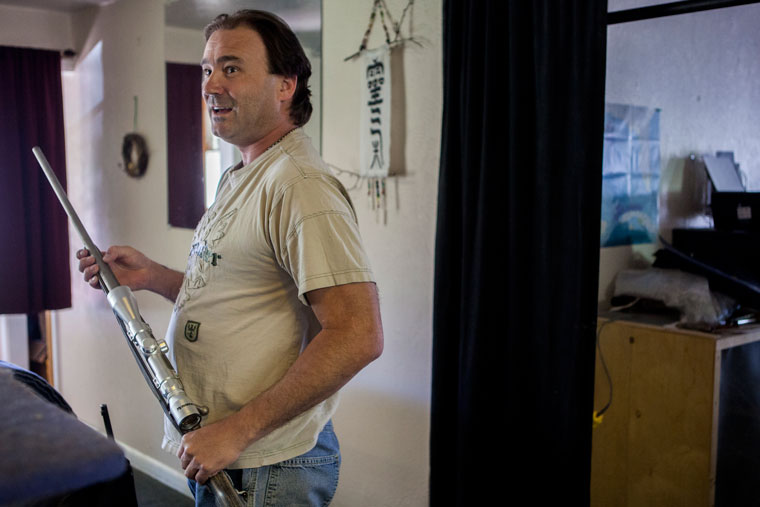Colorado’s gun town: In Nucla, every citizen must keep a firearm in their home
Driving north on U.S. 141 in southwestern Colorado, the road descends from red rock plateau into a wind-blown expanse of bedraggled shrubs and hardy desert trees called Paradox Valley. Passing only the occasional deer, the two-lane highway eventually ends at the Dolores River. Just beyond its muddy bank lies the tiny town of Nucla.
The area’s once-booming uranium mine has long been shuttered, while the halls of Nucla High School echo with the sounds of only a few dozen students. Main Street is dotted with boarded-up buildings and deserted after sunset. With a poverty rate of nearly 20 percent, it’s clear Nucla is in need of jobs, an economic boon that remains out of reach.
But there is at least one thing the town is not lacking: A gun in every home, required by law.
In May 2013, the Nucla Town Board passed the Family Protection Order, requiring every head of household to own a firearm. As written, the ordinance provides for the emergency management and general safety of a town with a population of less than 700.
Modeled on a similar law in Kennesaw, Georgia, that’s been on the books since 1982, Nucla’s ordinance includes all the expected exemptions: Those with a physical or mental disability that would prohibit them from using a firearm; anyone convicted of a felony; those who cannot afford a gun; and conscientious objectors.
Local law enforcement, consisting of a few Montrose County sheriff’s deputies, was never enlisted to go door to door to make sure everyone has a gun. Most people already had one anyway.
It’s a wholly unenforceable law, something the town board understands. And yet only one trustee out of six voted no, while most residents are apt to pass it off with a shrug. Fitting for a place called Paradox.
Nucla occupies a tiny dot in the largely rural, rugged map of Colorado’s Western Slope. It’s a place that, on first glance, has been forgotten. The nearest stoplight, hospital and Walmart are two hours away. There is a polling place for general elections in the equally-small town of Naturita five miles south though most people opt to mail in their ballots. But with a dwindling, aging population, their vote is barely a drop in the bucket.
As a rule, Nucla residents are self-sufficient folk, tenacious about their history and each other. It all feels very, very far away from the lawmaking and politicking happening 350 miles away in Denver. A state law limiting the size of ammunition magazines to 15 rounds, passed in response to the Aurora, Colorado, movie theater shooting, is seen as more of a nuisance than a matter of life and death.
The Family Protection Order is often framed by Nucla residents as an underdog rallying cry to catch the attention of those far-off lawmakers. A statement that says, “Hey! Remember us? We matter too.” But it’s also a continuation of life as is in Nucla, as it’s always been. A life that’s fiercely protected, despite it never being easy.
The Law
Board trustee Richard Craig says it all started, in a way, as a joke.
He was upset when state lawmakers began discussing stricter gun-control measures in early 2013. So he came into the next board meeting and offhandedly suggested adopting a mandatory gun ordinance.
“People said that’s a good idea, and I said, ‘woah,’” Craig explains with a laugh.
With a white ponytail and long beard — an act of rebellion stemming from his days just after the Navy — and multicolored woven bracelets from Peru inching up both wrists and ankles, Craig would fit in better at a gathering of Grateful Dead groupies than a town hall. In fact, Craig says he once did live a kind of nomadic existence, hopping across most of the West until settling down in Nucla two decades ago.
At 74, Craig still enjoys hunting, a hobby he shares with most of his neighbors.
“This is a hunting, ranching community and everybody already has guns,” he says, explaining that the law did not change anything, except perhaps for a brief uptick in media attention.

Bill Long handles one of the guns, a .300-caliber magnum rifle, he keeps at his home in Nucla, Colo., on June 17, 2014. Long was the only Town Board member to vote against the “Family Protection Order,” an ordinance that mandates gun ownership among the less than 700 residents. Photo by Morgan Spiehs/News21.
“It was more or less standing up for our rights as gun owners. I wasn’t looking for any change or notoriety at all,” Craig says, “Just to say, we do have guns. That’s just the way it is.”
Trustee Bill Long was the only dissenting vote, but he’s quick to clarify that it wasn’t because he doesn’t like guns. It was because of government overreach.
“There’s no difference between the government telling us you can’t own guns or you must own guns,” Long maintains.
Long was born and raised in the area. He left immediately after high school to see the world, living as far away as India. He moved back several years ago with the hope of getting involved in local politics to gain footing for a U.S. Senate run.
To Long, being raised with guns and learning to respect them as you would, say, a car, is just a part of life in a town as irrevocably tied to nature as Nucla is. He owns five or six guns himself.
After the ordinance passed, Long says he was contacted by the Brady Center to Prevent Gun Violence. According to Long, the Center offered to help him sue Nucla as it successfully had in Nelson, Georgia, which less than a month before attempted to pass its own mandatory gun ownership ordinance.
“Then they found out I had guns and I haven’t heard from them since,” Long says.
Guns
Like most people in Nucla, trustee Les Mahannah wears many hats. After rising by 5 a.m. most weekdays to work at the landfill just outside town, the 64-year-old returns home to run a small mechanic shop out of his garage. He’s fond of denim overalls and estimates distance “as the crow flies.” His piercing blue eyes are magnified by the glasses he’s worn since childhood, which was spent in local mining camps.
Mahannah still owns the rifle used to kill his first deer when he was 14. “It was a family thing as a father and son,” he says, “Something my dad and I looked forward to every year.”
Guns are natural, as he puts it, and should not be feared.
“I think if you’re raised with guns, you’re taught gun safety at a very early age,” Mahannah says, explaining that gun education — including gun club and hunter-safety courses — was part of the curriculum when he went to Nucla High School.
Mahannah credits this comfort around guns as a safer alternative to gun control. To him, being familiar with guns makes people much less prone to accidents.
“The criminals are still going to get the guns. The criminals are still going to kill people,” he says. “Without education about guns, you’re still going to have school shootings.”
To Mahannah and his fellow trustees, gun control is just a distraction from the real issues, especially mental health. Using the oft-argued sentiment that people, not guns, are the real culprit, Mahannah says guns are just a tool. “You can lay a gun on the table and it doesn’t do anything but lay there,” he says.
Craig says the federal government’s first reaction after tragic shootings is gun control, rather than allocating adequate mental-health funding. “Our country is spending millions of dollars on the sex life of the tsetse fly when they could’ve been putting it in mental-health services,” he argues.
Mahannah says he voted for the Family Protection Order to take a stand for an individual’s freedom to own a gun in this country.
“It’s a stand we took about how we felt about the Constitution. On our rights to shoot the prairie dogs in the hayfields when they become a nuisance,” he says.
It’s a point that hinges on another cornerstone of life in Nucla — guns not just for sport but survival. A single prairie dog can ruin a farmer’s entire crop. Bears regularly wander into town looking for food, threatening people’s pets and homes. It’s a unique spin on the “emergency management” referenced in the gun ordinance.
Colorado's Gun Town
Even Bill Long agrees with the sentiment. “The mentality of guns out here, where we actually use them for survival is different than in the city,” he says. “I just don’t see somebody going up to the (local) school and unloading on a bunch of people.”
And with such a small law enforcement presence, it’s often up to the people to protect themselves. Mahannah concedes that crime is not a huge problem in Nucla, though he’s had his fair share of break-ins and theft. But rather than depend on local sheriff’s deputies who have to travel a long way to respond to any call, he says passing the gun ordinance was a kind of crime deterrent.
“Would you break into somebody’s house if you knew they had a gun?” he asks. “Probably not.”
The Town
As legend goes, the region’s indigenous Ute people placed a spell over the valley — that whoever set foot there could never leave nor forget it. Sufficiently enchanted, socialist settlers claimed the area in the name of the Colorado Co-operative Company, or CCC, in 1894. Shunning the competitive economic system in favor of one based on sharing and equality, they called the town Nucla — the nucleus of everything.
Guns were a part of Nucla from the start. According to town historian Marie Templeton, those early settlers may have starved to death if they didn’t have guns to hunt wildlife.
“If they needed some meat, they killed a deer and used every bit of it,” Templeton, 84, explains of her husband’s family, who were among the original CCC pioneers. “It was imperative that you had a gun to find your food.”
Templeton, a self-described history nut, moved with her family to Nucla in 1940, long after the town’s socialist ideals had been abandoned. Her father was a miner who worked in the local uranium mine booming with the war effort. Some of the uranium mined in the region was actually used in the Manhattan Project.
After Three Mile Island, the demand for nuclear power dropped along with the price of uranium, and the local mines were eventually abandoned. Today, one of the largest employers is the member-owned San Miguel Power Association, which purchases its power wholesale from the Tri-State Generation and Transmission Association, whose facilities include the coal-powered Nucla Power Station. Now residents fear the plant is in danger of closing too.
According to Templeton, Nucla may not be able to meet new emissions regulations proposed by the Environmental Protection Agency, though Tri-State public affairs manager Drew Kramer said there has been no talk of shutting down the Nucla plant.
Craig echoes the opinion that rural America is dying. “Right now a lot of rural towns are just like us,” he claims. “We’re just struggling and trying to figure out how to keep our towns going.”
“Our biggest problem here is logistics,” he says. “We’re nowhere.”






